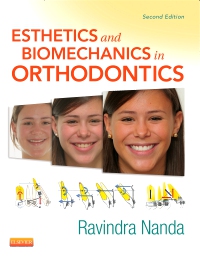
Esthetics and Biomechanics in Orthodontics, 2nd Edition
Hardcover

Esthetics and Biomechanics in Orthodontics, 2nd Edition provides everything the reader needs to know to successfully apply biomechanics in clinical orthodontics. This edition features new content in the areas of tooth movement, treating Class III malocclusions, skeletal anchorage, Surgery First treatment plans, and space closure. In addition to comprehensive guidance on basic biomechanic principles, this state-of-the-art reference also shows how all techniques can apply biomechanical principles to improve the force delivery, understand and prevent side effects, and achieve predictable results.
-
- Comprehensive coverage of diagnosis, treatment planning, and esthetics in tooth display gives readers a solid foundation in orthodontia and biomechanic problem solving
- Highly regarded lead author, Dr. Ravindra Nanda, is a widely known and respected educator in the field of orthodontics
- NEW! Content on the fundamentals that guide orthodontic tooth movement gives students insight into how orthodontic appliances work, along with their role in designing treatment methodologies
- NEW! Content on procedures and indications for optimal space closure helps students define priorities in treatment planning and understand all the treatment alternatives
- NEW! Detailed information on the different forms of skeletal anchorage (including mini-implant technology) shows how certain challenges associated with types of tooth movement can now be overcome by applying sound biomechanical principles to skeletal anchorage
- NEW! Detailed information on the biomechanics-based management of impacted canines offers treatment planning strategies and biomechanic techniques to achieve desired results without increasing treatment time
- NEW! Coverage of modalities for the treatment of Class III malocclusions gives students insight into new treatment protocols — such as corticotomy-assisted facemask therapy and corticotomy-assisted maxillary protraction — that are available to effectively treat these occurrences
- NEW! In-depth coverage of the Surgery First (SF) treatment plan offers step-by-step examples to help explain the technique of Sendai SF and its benefits
- Case reports include high-quality photographs, radiographs, and illustrations to better show biomechanical principles
-
- NEW! Content on the fundamentals that guide orthodontic tooth movement offers a clear understanding of how orthodontic appliances work and their role in designing treatment methodologies
- NEW! Content on procedures and indications for optimal space closure helps you define priorities in treatment planning and understand all the treatment alternatives
- NEW! Detailed information on biomechanics-based management of impacted canines provides treatment planning strategies and biomechanic techniques to achieve desired results without increasing treatment time
- NEW! Coverage on modalities for the treatment of Class III malocclusions offers insight into new treatment protocols — such as corticotomy-assisted facemask therapy and corticotomy-assisted maxillary protraction — that are available to effectively treat these occurrences
- NEW! Detailed information on the different forms of skeletal anchorage (including mini-implant technology) shows how certain challenges associated with types of tooth movement can now be overcome by applying sound biomechanical principles to skeletal anchorage
- NEW! In-depth coverage of the Surgery First (SF) treatment plan offers step-by-step examples to help explain the technique of Sendai SF and its benefits
-
Part 1: DIAGNOSIS AND ESTHETIC CONCEPTS
1. Individualized Orthodontic Diagnosis
2. Individualized Orthodontic Treatment Planning
3. Esthetics in Tooth Display and Smile Design
Part 2: BIOMECHANICS
4. Mechanical Principles of Tooth Movement
5. Biologic Mechanisms in Orthodontic Tooth Movement
6. Biomechanic Basis of Extraction Space Closure
7. Biomechanics Based Management of Impacted Canines
Part 3: MANAGEMENT OF VERTICAL DIMENSION PROBLEMS
8. Management of Deep Overbite Malocclusion
9. Management of Open Bite Malocclusion
10. Molar and Incisor Positioning to Achieve Occlusal and Esthetic Objectives
Part 4: MANAGEMENT OF CLASS II MALOCCLUSION
11. Strategies for Treatment of Young Patients with Class II Malocclusions
12. Non Extraction Class II Correction
13. Class II Correction with an Intermaxillary Fixed Non Compliance Device: Twin Force Bite Corrector
Part 5: MANAGEMENT OF CLASS III MALOCCLUSION
14. Treatment Strategies for Developing and Non-Developing Class III Malocclusions
15. Clinical Practice Guidelines for Developing Class III Malocclusion
16. Biomechanical Aspects of a Modified Protraction Headgear
17. New Modalities for the Treatment of Class III Malocclusions NEW!
Part 6: ESTHETICS WITH TEMPORARY ANCHORAGE DEVICES
18. Achieving Optimal Esthetics with Palatal Mini Implants NEW!
19. Expanding the Limits for Esthetic Strategies by Skeletal Anchorage
20. A Bioefficient Skeletal Anchorage System
21. A Novel Approach in Developing Facial Esthetics in Cleft Lip and Palate Patients
Part 7: ORTHOGNATHIC SURGERY
22. Esthetics and New Approaches to Orthognathic Surgery NEW!
23. Surgery First: The Protocol of Innovative Surgical Orthodontics NEW!
24. Biomechanical Factors in Surgical Orthodontics
Part 8: INTERDISCIPLINARY MANAGEMENT
25. Interdisciplinary Management of Complex Dental Problems
26. Missing Lateral Incisors: New Procedures and Indications for Optimal Space Closure NEW!
27. Interrelationship of Orthodontics with Periodontics and Restorative Dentistry
Part 9: FINISHING
28. Biomechanics Strategies for Optimal Finishing

 as described in our
as described in our 